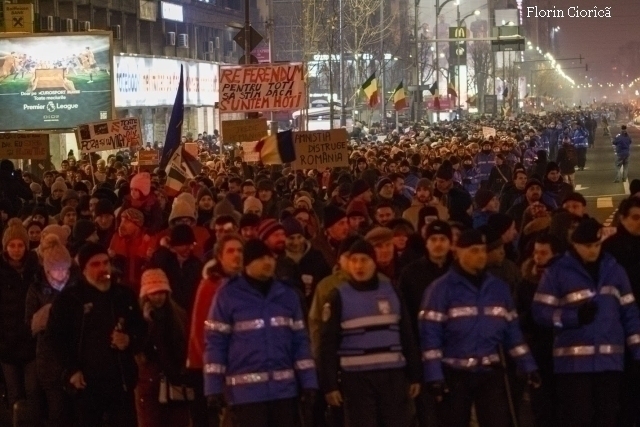Thousands take to the streets in Romania
Protests were held across Romania against governments plan to pardon thousands of prisoners and revise the criminal codes.
Warning: Trying to access array offset on null in /home/web/rri.ro/public/wp-content/themes/rri/template-parts/content.php on line 53

Warning: Trying to access array offset on null in /home/web/rri.ro/public/wp-content/themes/rri/template-parts/content.php on line 98
Bogdan Matei,
23.01.2017, 13:05
Thousands
of people again took to the streets on Sunday evening demanding the government
made up of the Social Democratic Party (PSD) and the Alliance of Liberals and
Democrats (ALDE) to scrap their draft emergency orders that would grant
collective pardon and decriminalise some offences. According to the drafts, the
government intends to pardon convicts sentenced to less than five years for
committing certain crimes and cut sentences by half for all prisoners aged over
60. The pardon might be conditioned on the payment of damages set by Courts within
one year after the offender is released from prison. The draft emergency orders
also bring changes to the criminal codes. They stipulate that denouncers will
no longer be exempt from criminal responsibility unless they file their
denouncement within six months after the offence was committed. Moreover, the
act of abuse of power causing financial damage of less than 50,000 euros will
be decriminalised.
The Social Democratic
Justice Minister, Florin Iordache, says that these emergency orders are needed in
order to ease overcrowding in prisons, as there are by nine thousand inmates
more than the prisons’ capacity and in order to comply with Constitutional
Court’s decisions. Iordache reminded that Romania had already been sentenced at
the European Court of Human Rights for what it defined as the inhumane
conditions in Romanian prisons. The Justice Minister also said that 2,500
prisoners would be released if the law were passed.
The country’s prosecutor
general, the chief anti-corruption prosecutor, the Supreme Court, and the chief
of the directorate fighting organised crime, as well as magistrates’
associations and civil rights groups are firmly against the move and the
intention to legislate through decrees instead of going through parliament. The
latter have argued that there is a lack of transparency as to the legal
framework regarding offences such as corruption, abuse of power and integrity.
In the city of Cluj, in the
south-west, in Ploiesti, in the south, in Timisoara in the west and in the
north-eastern city of Iasi, the general state of mind is outrage:
I for one, as a young
member of the Romanian nation, find it abnormal that individuals who stole
from the state and who have received court sentences be freed.
I don’t have anything against
freeing people who have stolen a chicken and some canned food, because thy
didn’t have anything to eat, but not offenders who have robbed this country.
Around 30,000 people marched on the streets of the capital Bucharest
stopping in front of the government headquarters and the offices of the
coalition parties. Protesters chanted Bucharest is saying NO to pardoning!,
In prison, not in power!, and In a democracy, the place of the thieves is in
prison!. The protests were peaceful and no violence was reported.
The head of state, Klaus Iohannis, joined the protesters for about 15
minutes. Iohannis, himself an opponent of the government’s recent decisions,
said he came to the University square to voice his outrage at the corrupt
politicians who plan to undermine the rule of law:
Changing the legislation
and pardoning hundreds of convicted politicians, allowing them to continue
their wrongdoings, is inconceivable. Romanians have every right to be
outraged.
The head of the Social
Democratic Party, Liviu Dragnea, has said that by joining the protesters
President Iohannis has in fact broken the law in an attempt to gain some political
advantage for himself. Some commentators say Dragnea is right in this respect
and accuse Iohannis of having breached his neutrality as a mediator. Others,
however, argue that the programme that has won the Social Democratic Party a
landslide victory in the recent parliamentary elections had no mention of the
fact that its main concern will be to release thieves from prison.






























